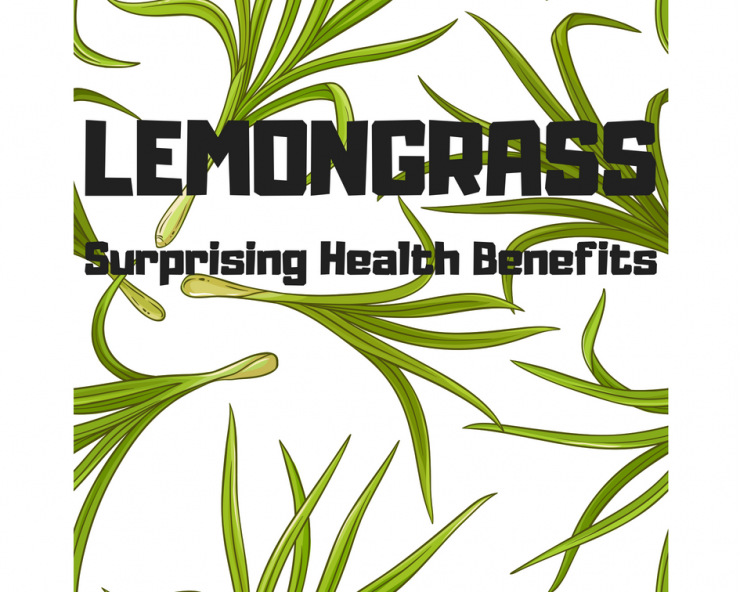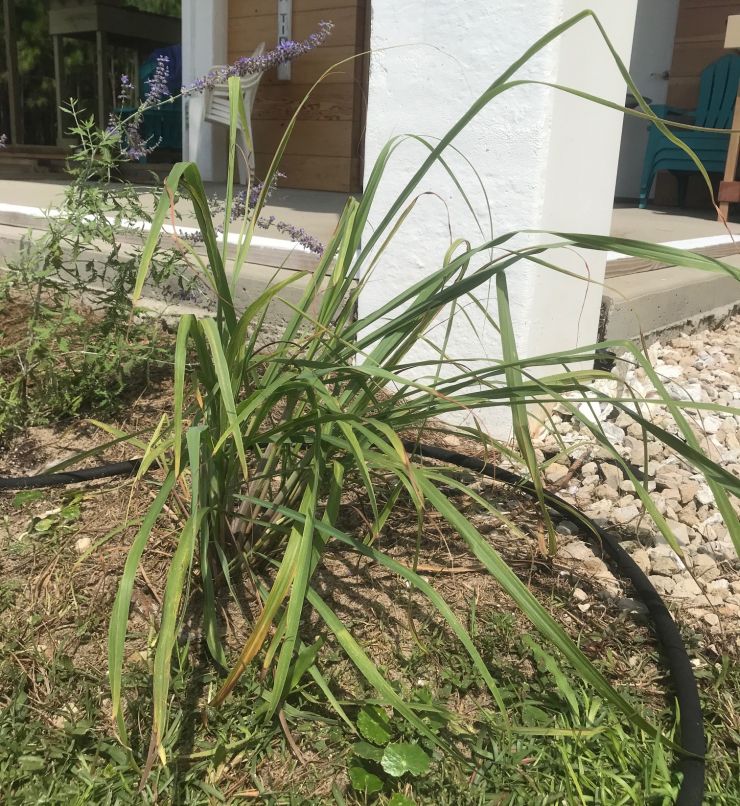
As summer rolls around and the Lemongrass plant in my garden starts to flourish, I am reminded that this herb continues to emerge at the top of the list when researching natural remedies. It has many diverse health benefits when used as an herb or in aromatherapy as an essential oil. It has an impressive number of essential nutrients, antioxidants and other beneficial compounds. It is a tall, perennial grass known as Cymbopogon citratus with a solid portion at the root end. The entire plant can be dried, powdered, sliced or the oil can be extracted. It has an amazing lemony flavor and scent with a hint of ginger and will repel insects. It is easily propagated by dividing the root clump or by simply putting a cutting in a jar of water for about 2 weeks until roots form and then transferring it to the garden. I have been drying it and adding it to my Elderberry Syrup Kit that can be purchased in my Etsy Shop.
Lemongrass Nutrients
The main components of lemongrass are lemonal and citral, which gives it anti-fungal and anti-microbial qualities, as well as providing a distinct lemony smell. Lemongrass is also a source of essential vitamins such as vitamin A, B1, B2, B3, B5, B6, C, and folate. It provides essential minerals such as potassium, calcium, magnesium, phosphorous, manganese, copper, zinc, and iron. It also contains antioxidants, flavonoids and several phenolic compounds all of which help provide its medicinal properties.
Uses
Lemongrass is traditionally used in Asian cuisines, especially those of Vietnam, Thailand, and Malaysia. Today it is universally used in tea blends for its flavor and aroma. You can chop the grass, boil in water, and let it steep for 10-15 minutes. Make sure you steep it well in order to reap the plant’s benefits in an easily digestible form. Herbal lemongrass tea is free of caffeine and tannins and will help remove toxins from the body by relieving fluid retention. Dried whole or cut lemongrass should be soaked for two hours in warm water before it is used in cooking. When wrapped in a paper bag, lemon grass stems can last 2 to 3 weeks in the refrigerator. The stems can also be frozen for several months. Always wrap and store separately, as lemon grass will impart its flavor to other foods.
What is Lemongrass Essential Oil?
Amazingly enough, besides being a delicious citrus seasoning and healing herb, most of us would never guess that there is so much healing power inside the fibrous stalks. The compounds in lemongrass essential oil possess anti-fungal, insecticidal, antiseptic and anti-inflammatory properties.
Health Benefits of Lemongrass
Lowers Cholesterol
Lemongrass has anti-hyperlipidemic and anti-hypercholesterolemic properties that support healthy cholesterol levels. Studies have shown that the regular consumption of lemongrass have significant results in sustaining healthy levels of triglycerides and reducing the LDL cholesterol in the body.
Detoxifies
Lemongrass helps detox the digestive tract, liver, kidneys, bladder and pancreas using its diuretic properties which flush harmful toxins out of the body. This can have a cleansing effect on lymphatic congestion and swelling or edema.
Prevents Cancer
Lemongrass is effective in treating various types of cancers without affecting the healthy normal cells of the body. Recent studies have shown that the citral helps inhibit the growth of heptic cancer cells especially early on and are most prevalent in the prevention of skin cancer. Another study provides supporting evidence regarding the anti-proliferative effect of citral in impeding the growth of human breast cancer cells.
Fights Staphylococcus aureus
Studies show that lemongrass essential oil has an anti-biofilm capacity and can fight against Staph infection. The phenols contained in lemongrass possess the ability to spread through the body tissues, cure biofilms, and disrupt growth and communication of germs.
Helps Stomach Disorders
The anti-microbial and anti-bacterial properties of lemongrass essential oil has been shown to help in fighting infections caused by pathogens such as Helicobacter pylori and Escherichia coli. The citral in lemongrass helps digest food and stimulates bowel function. The anti-inflammatory properties benefit constipation, ulcerative colitis, diarrhea, and nausea. Studies have shown that lemongrass oil is beneficial in the prevention of gastric ulcers.
Cures Fever
Lemongrass is also known as “fever grass,” owing to its beneficial effects in lowering fever. In Ayurvedic medicine lemongrass is used for curing fevers because of its anti-pyretic and diaphoretic effect that induces sweating.
Heals Cold and Flu
The antibacterial and antifungal properties of lemongrass can help fight colds and flu. In addition, it is full of Vitamin C that can strengthen your immune system. Use the essential oil in a diffuser for relief from blocked nasal passageways and asthma.
Treats Infections
The citral and limonene content in lemongrass oil works as an antiseptic and is effective in treating fungus and infections such as ringworm, sores, Athlete’s Foot, scabies, and urinary tract infections. Studies have shown that lemongrass exerts healing effects on dermatological infections, such as yeast infections, by inhibiting the growth of pathogens.
Reduces Aches
The phytonutrients present in lemongrass oil helps to improve blood circulation therefore relieving muscle spasms, backaches, sprains and cramps. Try rubbing diluted lemongrass oil on your body aches or add to a foot bath or massage.
Reduces Stress & Aids Sleep
The calming and mild smell of lemongrass oil is known to relieve stress, irritability, and insomnia as well as the duration and quality of sleep. Add lemongrass to your massage oil or body lotion.
Relieves Headaches
Try massaging diluted lemongrass oil on your temples and breathe in the relaxing lemony fragrance. The analgesic properties of lemongrass has a soothing effect and can alleviate the pain caused by headaches and migraines.
Improves Type-2 Diabetes
Lemongrass has been proven beneficial in treating type-2 diabetes. The citral helps maintain optimum levels of insulin and improves the tolerance of glucose in the body.
Boosts Immunity and Reduces Inflammtion
Studies have shown that the citral in lemongrass has an anti-inflammatory action inhibiting cytokine production which are the signaling molecules through which cells communicate. Inflammation is associated with just about every health condition and is known to play a role in autoimmune disorders. The body’s immune system can also be boosted by the compounds in lemongrass assisting in the better absorption of nutrients.
Improves Cellular Health
The antioxidant properties of lemongrass help protect the cells of the body from free radical damage and will stimulate the regeneration of cells.
Boosts Metabolism and Burns Fat
Studies show that citral in lemongrass prevents the accumulation of abdominal fat and promotes the use of this stored energy. It also enhances the oxidation of fatty acids which help with a healthy metabolism.
Acts as a Natural Bug Repellant
Evidence shows that lemongrass can be used as a natural insect repellent helping prevent the occurrence of insect-borne diseases such as malaria, dengue and Lyme.The high citral and geraniol content of lemongrass oil is known to repel insects such as mosquitoes, ants and fleas.

Regulates High Blood Pressure
Lemongrass is rich in potassium which increases the production of urine in our body, which in turn stimulates blood circulation and lowers blood pressure. By increasing blood circulation, it also helps in purifying the liver.
Effective in Skin and Hair Products
The antiseptic and astringent properties of lemongrass make it an effective addition to skin and hair products especially for oily or acne prone skin. It can strengthen hair follicles and skin tissue and tone pores. The bacteria-killing properties make it a great addition to hand and body wash.Relieves menstrual pain
Drinking lemongrass tea is excellent for women’s health bringing relief to menstrual pain, hot flashes as well as nausea and irritability.
Lemongrass Oil Side Effects
All essential oils are VERY POTENT so always dilute them before using.
Always check with your health care professional before using lemongrass essential oil for therapeutic use, especially during pregnancy, when trying to conceive, and breastfeeding.
How are you using lemongrass?
